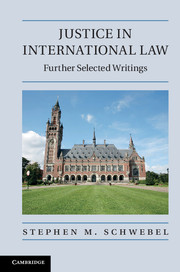Book contents
- Frontmatter
- Contents
- PART I International Court of Justice
- PART II International arbitration
- PART III Miscellaneous
- 27 May preparatory work be used to correct rather than confirm the “clear” meaning of a treaty provision?
- 28 Clean hands, principle
- 29 Compound interest in international law
- 30 The prescience and pertinence of the ILO
- 31 Is mediation of foreign investment disputes plausible?
- 32 Hersch Lauterpacht: fragments for a portrait
- 33 International Law: Being the Collected Papers of Hersch Lauterpacht
- Collected publications, judicial opinions and book reviews
- Index
29 - Compound interest in international law
from PART III - Miscellaneous
Published online by Cambridge University Press: 07 September 2011
- Frontmatter
- Contents
- PART I International Court of Justice
- PART II International arbitration
- PART III Miscellaneous
- 27 May preparatory work be used to correct rather than confirm the “clear” meaning of a treaty provision?
- 28 Clean hands, principle
- 29 Compound interest in international law
- 30 The prescience and pertinence of the ILO
- 31 Is mediation of foreign investment disputes plausible?
- 32 Hersch Lauterpacht: fragments for a portrait
- 33 International Law: Being the Collected Papers of Hersch Lauterpacht
- Collected publications, judicial opinions and book reviews
- Index
Summary
Professor Gaetano Arangio-Ruiz has distinguished himself as a scholar of international law, a teacher of international law, an international arbitrator, an international negotiator for Italy in United Nations and other fora, and an expositor and codifier of international law. In that latter capacity, he served as a member of the International Law Commission of the United Nations, and as the Commission's Special Rapporteur on the Responsibility of States for Internationally Wrongful Acts. The Commission's engagement with the topic of State responsibility virtually spanned the life of the Commission itself. Professor Arangio-Ruiz's contributions to that epochal work are outstanding.
As Special Rapporteur, Arangio-Ruiz prepared a series of Reports which rank among the finest produced in the history of the International Law Commission. They are characterized by profound learning, acute analysis and a constructive spirit. As Special Rapporteur, Professor Arangio-Ruiz was prepared to propose progressive solutions, some of which were adopted by the Commission. Others, while not adopted in terms, influenced the content of the Articles as finally adopted by the Commission on Second Reading on August 9, 2001.
It is to an aspect of one such article, Article 38, entitled “Interest” – and more, to its commentary as initially prepared by Professor Arangio-Ruiz – that this paper is directed.
- Type
- Chapter
- Information
- Justice in International LawFurther Selected Writings, pp. 302 - 313Publisher: Cambridge University PressPrint publication year: 2011



